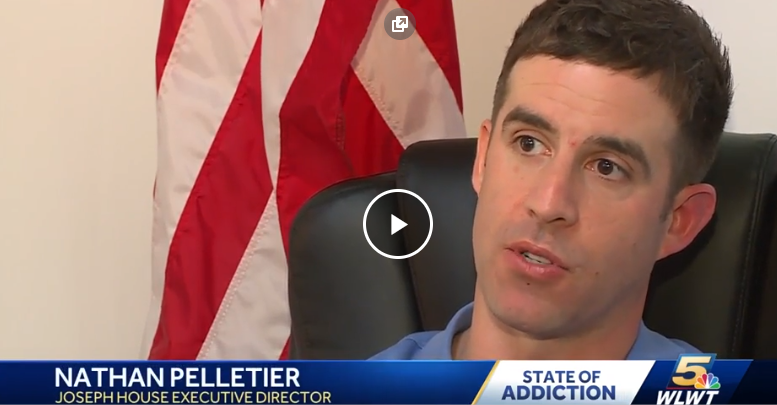Joseph House expands outpatient services, can now serve women

Joseph House Executive Director Nate Pelletier spoke with WLWT about the outpatient changes at Joseph House. Click on the above picture to view the story.
We have expanded our outpatient services to include veterans who are not experiencing homelessness. Effective July 1, veterans who are not homeless can participate in outpatient programs, including the Tristate’s nearly 10,000 female veterans.
Because of infrastructure and funding, we have served only male veterans experiencing homelessness and struggling with addiction in our 24-year history, but a recent restructuring of costs and program adaptations, as well as the addition of Medicaid funding, has changed that.
More women are transitioning to civilian life after serving in the military every year, and services like what Joseph House provides have not always been readily available, even though women veterans may have the same post-service challenges as men.
The mission of Joseph House is to help veterans suffering from addiction regain their independence and lead healthy, productive lives after serving in the military. Reaching this point in our operations, capacity and funding structure has been a long-time coming and our exceptional team is ready to serve them. Our success to date, and now this milestone, would not have been possible without the support of our regional partners.
You may have some questions as we roll out this program and start to serve additional veterans, including women. Below are answers to frequently asked questions.
What are the differences between inpatient and outpatient services offered?
Certified by the Ohio Department of Mental Health and Addiction Services, Joseph House offers inpatient and outpatient services. Inpatient services include three months of individual and group therapy, substance abuse education classes, and case management for up to 20 male veterans in a supportive transitional-to-permanent housing model. Outpatient services last six to eight months and include the matrix model of care, group counseling and case management. Joseph House also works with homeless veterans to prepare them for employment, permanent housing and general life skills to facilitate their ability to thrive independently. Learn more about our programs here.
What will the program be like for female veterans?
Female veterans who participate in outpatient services will not live on-site at our buildings. After initial assessment at Joseph House, their counselor will work with them to build a program and schedule of sessions that focus on the following:
- Sustaining sobriety:
- Sober living skills development
- Relapse prevention training
- Continued 12-step recovery support through an identified sponsor
- Family and friends group therapy
- Mindful yoga therapy techniques
- Reintegration into the community:
- Relationship counseling
- Conflict resolution training
- Reunification with family (as needed)
- Financial planning assistance
- Employment assistance
- Housing assistance
- Extracurricular activity development (hobbies and healthy interests)
Will this change impact Joseph House’s capacity to deliver inpatient services?
The capacity of our inpatient programs will not change based on adding capabilities to serve female veterans and veterans not experiencing homelessness through our outpatient Ready & Forward program.
How can someone get help from Joseph House?
Contact us at [email protected] or by calling (513) 241-2965. We will set up an assessment with one of our clinical professionals to determine the appropriate program.